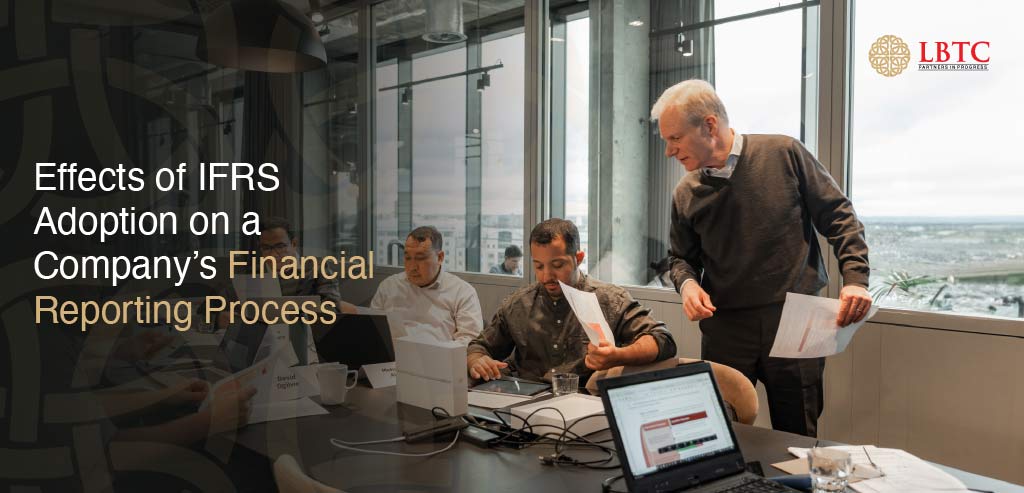
In your coursework, you have probably encountered International Financial Reporting Standards (IFRS) if you are a college student hoping to become an accounting whiz. Getting the most out of your accounting assignments requires that you comprehend how implementing IFRS would affect a company’s financial reporting procedure. We’ll explore the theoretical underpinnings of IFRS and their effects on financial reporting in this extensive tutorial, giving you the skills and understanding you need to finish your assignment on international financial reporting. So buckle up and prepare to explore the world of IFRS and its importance.
Let’s make sure we understand exactly what IFRS is before we go into the repercussions. The International Accounting Standards Board (IASB) created International Financial Reporting Standards (IFRS) to provide a common financial reporting language for businesses worldwide, enabling the preparation of comparable financial statements.
Adopting International Financial Reporting Standards (IFRS) has significant effects on how a business reports its financial information. This change improves comparability across borders, necessitating intricate transitions, affecting financial statements and ratios, and requiring more information. It also affects capital market positioning, taxation, and industry practices. University students must comprehend these ramifications in order to successfully traverse the complex world of accounting assignments.
Increased Comparability:
One of the primary objectives of IFRS adoption is to enhance the comparability of financial statements globally. Companies following IFRS standards provide stakeholders with a more uniform set of financial reports, making it easier for investors, analysts, and other users to assess and compare the performance of different entities. This standardization encourages international investments and facilitates a more efficient allocation of capital.
Complexity and Implementation Challenges:
While the move towards a global accounting language is beneficial in the long run, the transition to IFRS can pose significant challenges for companies. The shift from local Generally Accepted Accounting Principles (GAAP) to IFRS requires a thorough understanding of the new standards, potentially leading to increased complexity in financial reporting. Companies may face difficulties in interpreting and applying IFRS principles, resulting in the need for extensive training and system upgrades.
Improved Transparency and Disclosure:
IFRS emphasizes transparency and requires companies to provide more extensive disclosures in their financial statements. This includes additional information about the risks, uncertainties, and judgments involved in financial reporting. Enhanced transparency helps stakeholders better understand the financial health of a company, contributing to informed decision-making.
Impact on Key Performance Indicators (KPIs):
Key performance indicators are crucial for evaluating a company’s success. IFRS adoption may influence the calculation and presentation of KPIs. For instance, earnings before interest, taxes, depreciation, and amortization (EBITDA) may be affected by changes in accounting for certain expenses. Companies need to communicate these changes effectively to ensure that stakeholders correctly interpret and compare performance metrics.
Global Convergence and Stakeholder Confidence:
The adoption of IFRS promotes global convergence in financial reporting standards, aligning accounting practices across countries. This convergence fosters confidence among international investors and stakeholders, as it implies a commitment to a standardized, high-quality reporting framework. Companies adhering to IFRS are seen as more credible and trustworthy in the eyes of the global business community.
As companies navigate the transition to International Financial Reporting Standards (IFRS), several crucial steps shape their journey toward global accounting conformity. Here’s a concise overview of the key considerations involved in preparing for IFRS adoption:
- Conducting Impact Assessment:
-
- Evaluate the impact on financial reporting by comparing current accounting practices with IFRS requirements.
- This assessment lays the groundwork for the entire transition process.
- Gap Analysis and Identification of Differences:
-
- Perform a gap analysis to pinpoint disparities between existing financial reporting frameworks and IFRS.
- Analysis of identified gaps helps assess their significance for necessary adjustments.
- Designing Transition Plans:
-
- Develop comprehensive plans outlining specific actions, timelines, and responsibilities for a smooth adoption process.
- A well-structured transition plan is crucial for an efficient transition.
- Training and Skill Development:
-
- Invest in training for finance and accounting teams to ensure accurate understanding and application of IFRS principles.
- Acknowledge the ongoing importance of education and skill development in the transition process.
- Updating Accounting Systems and Procedures:
-
- Recognise the resource-intensive nature of updating systems and procedures, involving tasks like data migration and software customisation.
- Understand complexities such as system testing during the transition.
- Assessing Impact on Internal Controls:
-
- Evaluate how IFRS adoption affects internal controls, identifying new control requirements and potential changes to existing controls.
- Crucial for maintaining financial reporting integrity.
- Engaging with External Auditors:
-
- Collaborate closely with external auditors to ensure accuracy and compliance of financial statements.
- Recognise the collaborative nature and importance of this relationship.
- Managing Stakeholder Expectations:
-
- Effectively communicate with stakeholders, including investors, analysts, and regulatory bodies.
- Transparent communication is crucial for maintaining investor confidence.
- Continuous Monitoring and Quality Assurance:
-
- Implement ongoing monitoring and quality assurance measures post-transition to uphold IFRS standards.
- Recognise the long-term commitment required to maintain consistency.
- Documentation and Disclosure:
-
- Maintain thorough documentation of decisions, assumptions, and judgments made during the transition.
- Provide comprehensive disclosures in financial statements regarding IFRS adoption.
Conclusion
Lastly, understanding these key considerations is vital for students tackling accounting assignments. The IFRS adoption process involves meticulous planning, training, and consideration of various factors, offering a competitive edge in academic studies and future accounting careers. As you approach your assignments, keep in mind the multifaceted impact of IFRS on financial reporting, ensuring a comprehensive analysis that goes beyond a mere transition between accounting standards. This knowledge not only enhances academic performance but also provides practical insights applicable to the real world of accounting. You can choose to sign up for an IFRS course at LBTC.

Leave a Reply